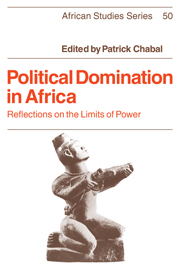Book contents
- Frontmatter
- Contents
- Acknowledgements
- Introduction: Thinking about politics in Africa
- 1 Democracy in Africa
- 2 Politics and vision in Africa: the interplay of domination, equality and liberty
- 3 Democracy and ethnocentrism
- 4 Wails and whispers: the people's voice in West African Muslim politics
- 5 Revolutionary democracy in Africa: the case of Guinea-Bissau
- 6 Civil society in Africa
- 7 Political accountability in African history
- 8 The politics of representation and good government in post-colonial Africa
- Notes
- Index
Introduction: Thinking about politics in Africa
Published online by Cambridge University Press: 26 January 2010
- Frontmatter
- Contents
- Acknowledgements
- Introduction: Thinking about politics in Africa
- 1 Democracy in Africa
- 2 Politics and vision in Africa: the interplay of domination, equality and liberty
- 3 Democracy and ethnocentrism
- 4 Wails and whispers: the people's voice in West African Muslim politics
- 5 Revolutionary democracy in Africa: the case of Guinea-Bissau
- 6 Civil society in Africa
- 7 Political accountability in African history
- 8 The politics of representation and good government in post-colonial Africa
- Notes
- Index
Summary
This book opens with Richard Sklar's Presidential Address to the Twenty-Sixth Meeting of the American African Studies Association. ‘Democracy in Africa’ was, quite appropriately, a challenge to Africanists. The argument, and it is a powerful one after so many years of political decay and economic failure in Africa, is a defence of democracy. Sklar concludes that there is no convincing defence of what he calls ‘developmental dictatorship’ and no convincing demonstration of the incompatibility of democracy and development. Though ‘the imperatives of development are far more demanding than the claims of democracy’, Sklar tells us, the record so far does not suggest that the absence of democracy has served Africa particularly well economically, nor does it provide moral or practical grounds for thinking that Africans would not prefer to live in democracies if they were given the choice.
This argument is only partly a plea for the formulation and construction of what Sklar defines as ‘developmental democracy’. It is also, and perhaps primarily, a moral injunction to re-examine the foundations of our thinking about African politics and to reflect creatively about the relationship between good government and economic prosperity in Africa. Sklar's plea for ‘developmental democracy’, though programmatic in appearance, is in fact an invitation to return to the fundament of political theory. What is politics? What is democracy? What is political accountabilty? What is good government?
This volume is one response to the intellectual, moral and practical challenge set out in Sklar's paper.
- Type
- Chapter
- Information
- Political Domination in Africa , pp. 1 - 16Publisher: Cambridge University PressPrint publication year: 1986
- 4
- Cited by

